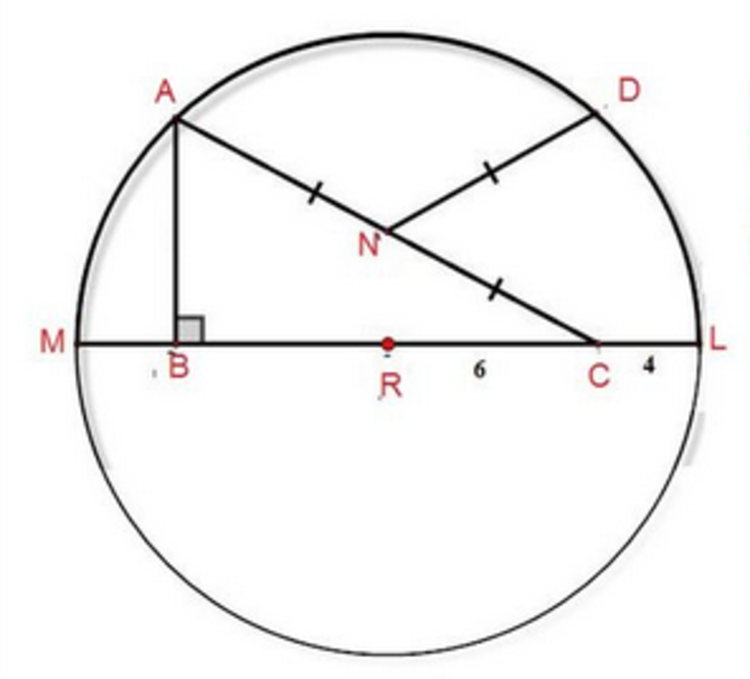A geometry problem by Ahmed Moh AbuBakr
 R
C
=
6
,
C
L
=
4
. Find distance
A
B
.
R
C
=
6
,
C
L
=
4
. Find distance
A
B
.
The answer is 8.000000000000000.
This section requires Javascript.
You are seeing this because something didn't load right. We suggest you, (a) try
refreshing the page, (b) enabling javascript if it is disabled on your browser and,
finally, (c)
loading the
non-javascript version of this page
. We're sorry about the hassle.
3 solutions
It is assumed that R is the center of the circle and that M L is a diameter.
Since Δ A B C is a right triangle and N is the midpoint of A C , we know that ∣ B N ∣ = ∣ A N ∣ . Also, since ∣ D N ∣ = ∣ A N ∣ = ∣ N C ∣ and D lies on the circle, we know that, by symmetry, B N and N D joined together form a straight line. Thus the quadrilateral A B C D is a rectangle inscribed in a semicircle, and so R , as the center of the circle, must also be the midpoint of B C .
Now place R at the origin of an x y -grid and orient the circle so that B C lies along the x − axis. Then since the radius ∣ R L ∣ of the circle is 6 + 4 = 1 0 , the equation of the circle is x 2 + y 2 = 1 0 0 .
Finally, as ∣ B R ∣ = ∣ R C ∣ = 6 , the coordinates of A will be ( − 6 , A y ) , and since A lies on the circle we know that ( − 6 ) 2 + A y 2 = 1 0 0 ⟹ A y = 8 , and so ∣ A B ∣ = 8 .
@Ahmed Moh AbuBakr Is it correct to assume that R is the center of the circle? If so, then it might be best to mention that in the question. :)
Log in to reply
You can get that through the medium that comes out of the corner of the menu = half tendon @Brian Charlesworth
so in the end RC=RB @Brian Charlesworth
Draw a right triangle M A L with ∠ M A L = 9 0
Then by right triangle altitude theorem: x 4 = 1 6 x where x = A B
Solving this gives x = 8
Simply you have x=rcos(angle) so the cosine of the angle is equal to 3/5( because the radius is 10 and x=6). With the same logic y=rsin(angle) then y=10(4/5)=8. Obviuosly i can do that because ADBC is a rectangle( by the property of the median of a right angled triangle)